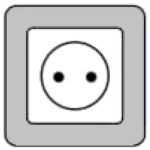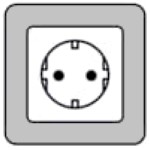Plug For Slovenia: What You Need To Know
What is the plug for Slovenia? Before you travel, check the information below to make sure your electronic devices are compatible with the outlet type and voltage.
Electrical Summary
Plug Compatibility: Type C, Type F
Voltage: 220V – 240V
Frequency: 50 Hz
Type C

Type F

Can North Americans use Electronics in Slovenia without an Adapter?
No! North Americans will need an adapter for the outlets and a transformer for the voltage when traveling to Slovenia. North Americans device plugs will not work with the outlet types in Slovenia. Also, the voltage in Slovenia is different from North American voltages.
Can Europeans use Electronics in Slovenia without an adapter?
Yes! Europeans do not need a travel adapter or transformer when traveling to Slovenia. Most device plugs will work with the outlet types in Slovenia. Also, the voltage in Slovenia is the same as in Europe.
What Outlet does Slovenia Use?
Type C

Type C plug sockets are used in Europe, Africa and Asia. They have two round pins and no grounding pin. These plugs are typically used with devices that have a voltage of 220-240V. This outlet is rated for 2.5 amps. Plug Type E, and Type F are compatible with this socket. All other plug types will need an adapter.
Type F

Type F electrical plug sockets are used in Germany, Spain, Italy and some parts of Africa. They have two round pins and a grounding pin. These outlets are typically used with devices that have a voltage of 220-240V. This outlet is rated for 16 amps. Plug Type C and Type E are compatible with this socket. All other plug types will need an adapter.
Is it safe to drink water in Slovenia?
Tap water in Slovenia is generally safe to drink, and the water supply is well-regulated by the government. The water treatment process includes several stages, such as filtration, disinfection, and distribution through a network of pipes.
In general, tap water in Slovenia is of high quality and meets the European Union standards for drinking water. However, there may be variations in water quality depending on the location, and it is recommended to check with local authorities if there are any concerns.
Bottled water is also widely available in Slovenia, and it is safe to drink. If you prefer to use bottled water or are unsure about the quality of the tap water in a particular location, it is recommended to use bottled water or a water filtration system to ensure safe drinking water.
We recommend always packing a filtered water bottle when traveling:
Travel Essentials
Be sure to check our list of travel essentials before your trip!
Should I get travel insurance when traveling to Slovenia?
It is generally recommended to get travel insurance when traveling to a different country. Travel insurance can provide financial protection and peace of mind in case of unexpected events, such as medical emergencies, trip cancellations, lost or stolen baggage, or other travel-related mishaps.
Travel insurance can cover various expenses related to your trip, such as medical expenses, emergency medical transportation, trip cancellation or interruption, lost or stolen baggage or personal belongings, and other travel-related expenses.
Before purchasing travel insurance, it’s important to carefully review the policy details, including the coverage limits, exclusions, and any applicable deductibles or copays. You should also make sure that the policy covers any activities or destinations that you plan to participate in or visit during your trip.
Travel Summary
The capital city, Ljubljana, is a picturesque city with a vibrant atmosphere, featuring colorful buildings, lively cafes, and a beautiful castle overlooking the city. Other major cities in Slovenia include Maribor, a historic town known for its wine production, and Piran, a charming coastal town with medieval architecture and stunning views of the Adriatic Sea.
Slovenia is also home to many natural wonders, including the Julian Alps, Lake Bled, and the Postojna Cave system. Visitors can enjoy hiking, skiing, and other outdoor activities in the mountains and forests, or relax on the beaches and coastal resorts in the summer.
Slovenian cuisine is diverse and delicious, with a range of traditional dishes such as potica (a sweet bread with various fillings), jota (a bean and sauerkraut soup), and štruklji (a type of dumpling). The country is also known for its wine production, with several regions producing high-quality wines.
Slovenia is a welcoming destination for travelers, with a friendly and hospitable population. The official language is Slovenian, but English is widely spoken and understood in major tourist areas. The country has a well-developed tourism infrastructure, with a range of accommodations and activities to suit all budgets and interests.
Overall, Slovenia is a hidden gem of Europe, offering a unique and unforgettable travel experience. With its stunning natural landscapes, charming cities, and delicious cuisine, Slovenia is a perfect destination for anyone looking to explore the beauty and culture of central Europe.
Traveling to another country? Check out our Countries page for more info.